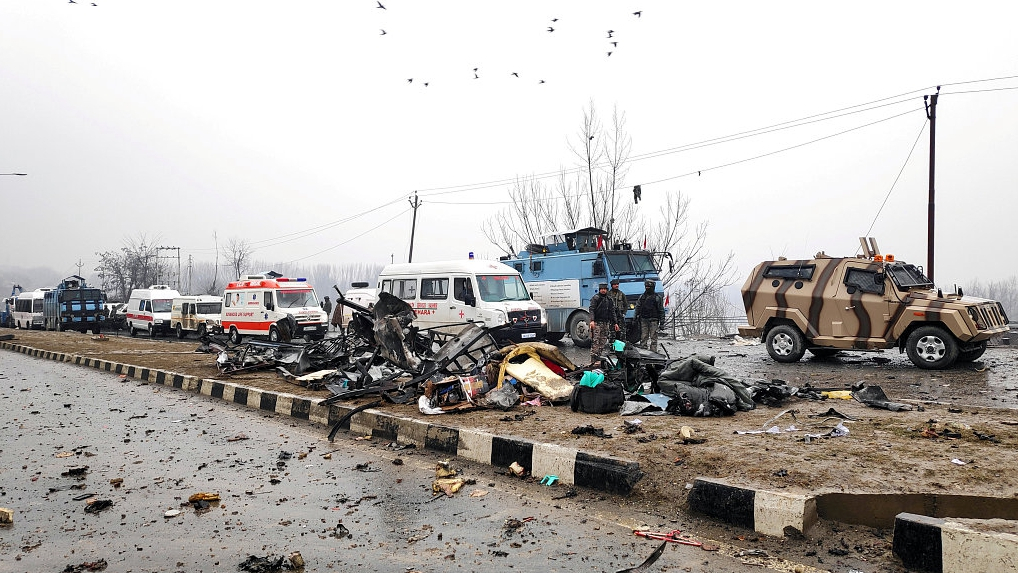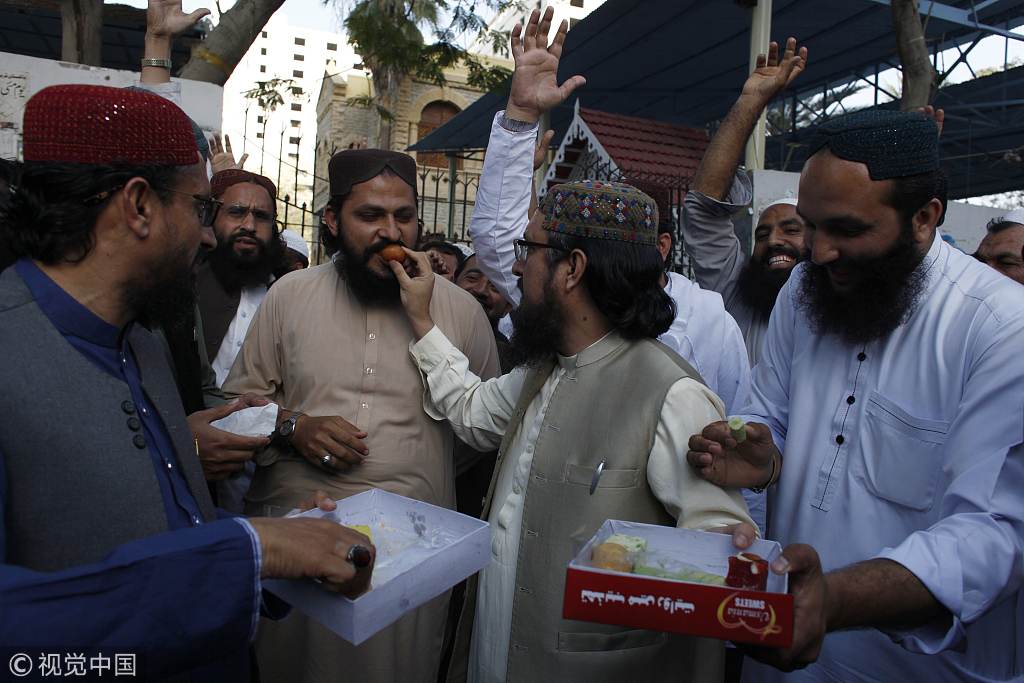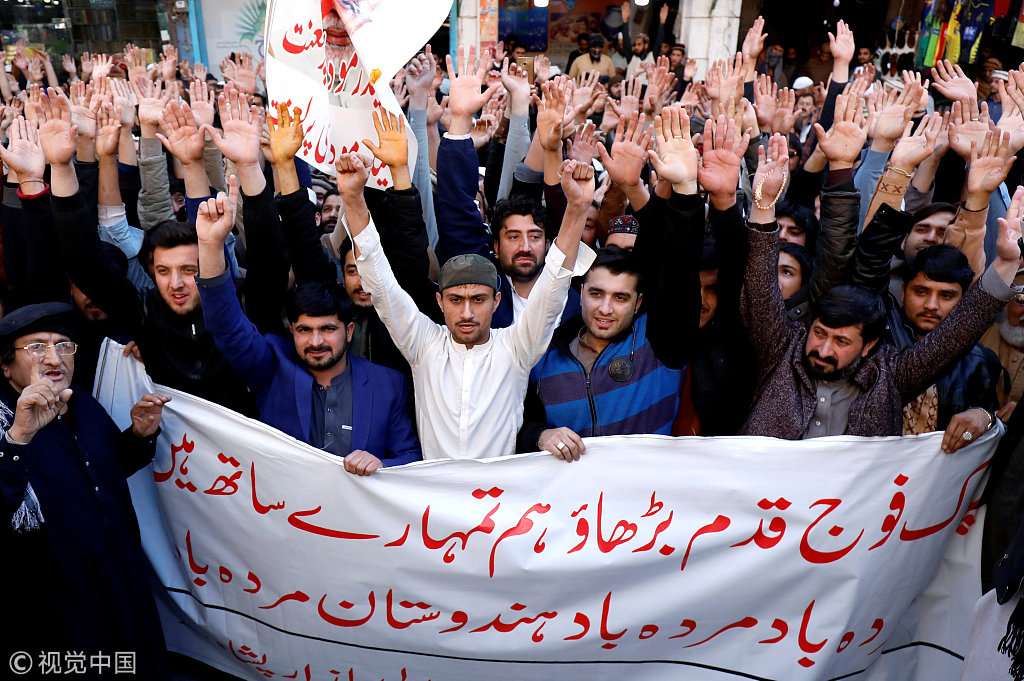
Analysis
22:38, 28-Feb-2019
There will be no war between India and Pakistan
Updated
08:07, 01-Mar-2019
Xu Sicong

Given the sharp escalation of tensions between India and Pakistan since the Pulwama terror attack on February 14, some media reports made it look like that the two sides are on the verge of a full-fledged war. However, experts shrugged off such a suggestion, expressing the belief that the heightened tension will soon die down and a war is most certainly to be averted.
On February 14, the India-controlled Kashmir suffered a terrorist attack where 40 Indian troops were killed. As India accused Pakistan of supporting the terror group responsible for the attack, it launched an airstrike in Pakistan-controlled Kashmir on Tuesday in apparent retaliation against its northern neighbor that it has fought three wars with since 1947, sharply escalating the crisis.
Pakistan retaliated on Wednesday, and shot down two Indian military jets crossing the Line of Control, the military line dividing the Kashmir region, and captured one pilot. It was the first time since the third India-Pakistan war in 1971 that the two sides have engaged in an aerial dogfight.

People celebrate in Karachi after Pakistani Army shot down two Indian Air Force jets, February 27, 2019. /VCG Photo
People celebrate in Karachi after Pakistani Army shot down two Indian Air Force jets, February 27, 2019. /VCG Photo
The military standoff is described by some to have been the worst in almost half a century and has caused some media outlets to speculate that the two sides will plunge into a war. However, Long Xingchun, a professor at the School of Foreign Languages of China West Normal University, believes that the prospect of a war is far-fetched. He pointed out that skirmishes of this kind were not unusual in the two countries' history, with the last one taking place in September 2016 when the Indian army carried out strikes against Pakistan following the Uri terror attack.
Long also explained that the recent events have followed the general pattern of many of the military conflicts between the two countries where Pakistani militants initiated attacks on facilities in India-controlled Kashmir region, causing the Indian side to seek vengeance, which then led to a further escalation of the situation. Judging from how these conflicts ended in the past time, he believes that this time will be no different. "The tensions are going to subdue eventually, and the two sides will sit down and talk," Long said.
Cheng Xizhong, senior fellow at Chahar Institute and director of the South Asian Society of China, made the same prediction. Two of his observations are worth noting. He said that the areas where military action was targeted are limited to those close to the Line of Control, suggesting that "the two sides have no real intention of escalating tensions further"; second, the two sides have avoided hitting military targets and civilians, instead, claiming to strike "terrorist camps," which were actually only "open ground", Cheng said.

People chant slogans in Peshawar during a rally after Pakistani Army shot down two Indian Air Force jets, February 27, 2019. /VCG Photo
People chant slogans in Peshawar during a rally after Pakistani Army shot down two Indian Air Force jets, February 27, 2019. /VCG Photo
He also believes that Indian Prime Minister Narendra Modi's response is mostly political theater. Even though many analysts pointed to India's upcoming election as a key factor prompting such a "fierce response", Cheng said that a similar reaction could be expected even without an election looming. Given the long-standing hostilities between India and Pakistan which largely centers on territorial disputes over Kashmir, a tough response is what it takes for Modi to quell the public anger that has reached a fever pitch at home. Moreover, the potential economic costs also deter the two sides from opting for a war, according to Cheng.
Apart from a lack of a real appetite for both sides to stage a full-blown war, the international community does not have any interest in seeing such a scenario unfolding, either. For example, both Cheng and Long said a war will surely complicate the U.S. relationships with India and Pakistan. If Trump chooses to take India's side, Pakistan will, without doubt, cease cooperating with the U.S. on combating terrorism in Afghanistan, which will represent a setback for U.S.' counter-terrorism efforts in the region.
From China's perspective, a war is against its interest as well. First of all, Long pointed out that a war would deal a heavy blow to the ongoing Belt and Road Initiative in Pakistan. Second, Cheng said that the country would also have a difficult time choosing sides. He explained that even though China shares one of the closest relationships with Pakistan, it also highly values relations with India, another emerging market that boasts a population of over 1.3 billion people. The above reasons explain why both the U.S. and China have called for restraint from India and Pakistan.
(Cover Photo: Indian soldiers examine the debris after an explosion in Lethpora in south Kashmir's Pulwama district, February 14, 2019. /VCG Photo)
(If you want to contribute and have specific expertise, please contact us at opinions@cgtn.com.)

SITEMAP
Copyright © 2018 CGTN. Beijing ICP prepared NO.16065310-3
Copyright © 2018 CGTN. Beijing ICP prepared NO.16065310-3